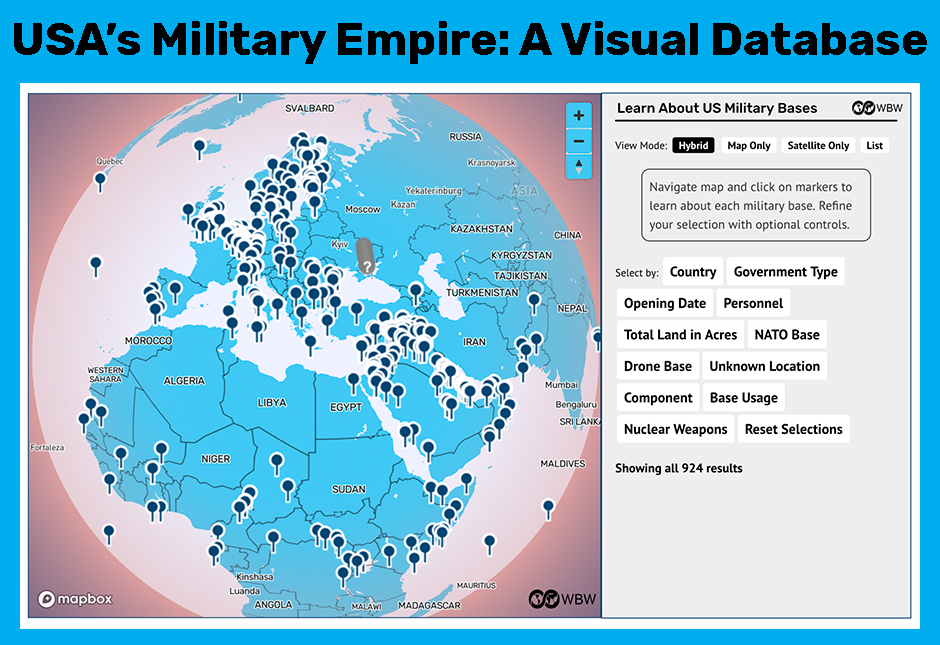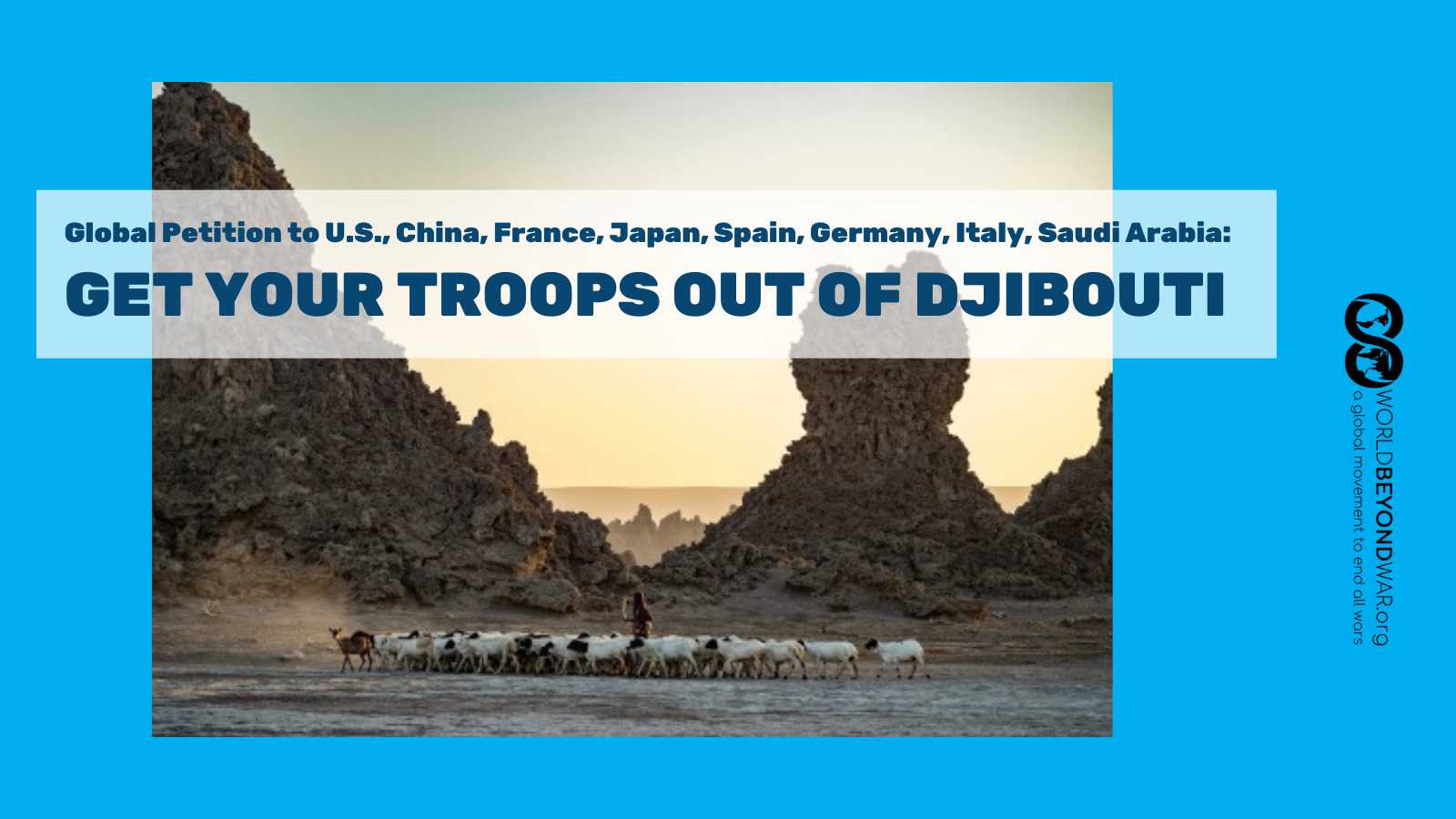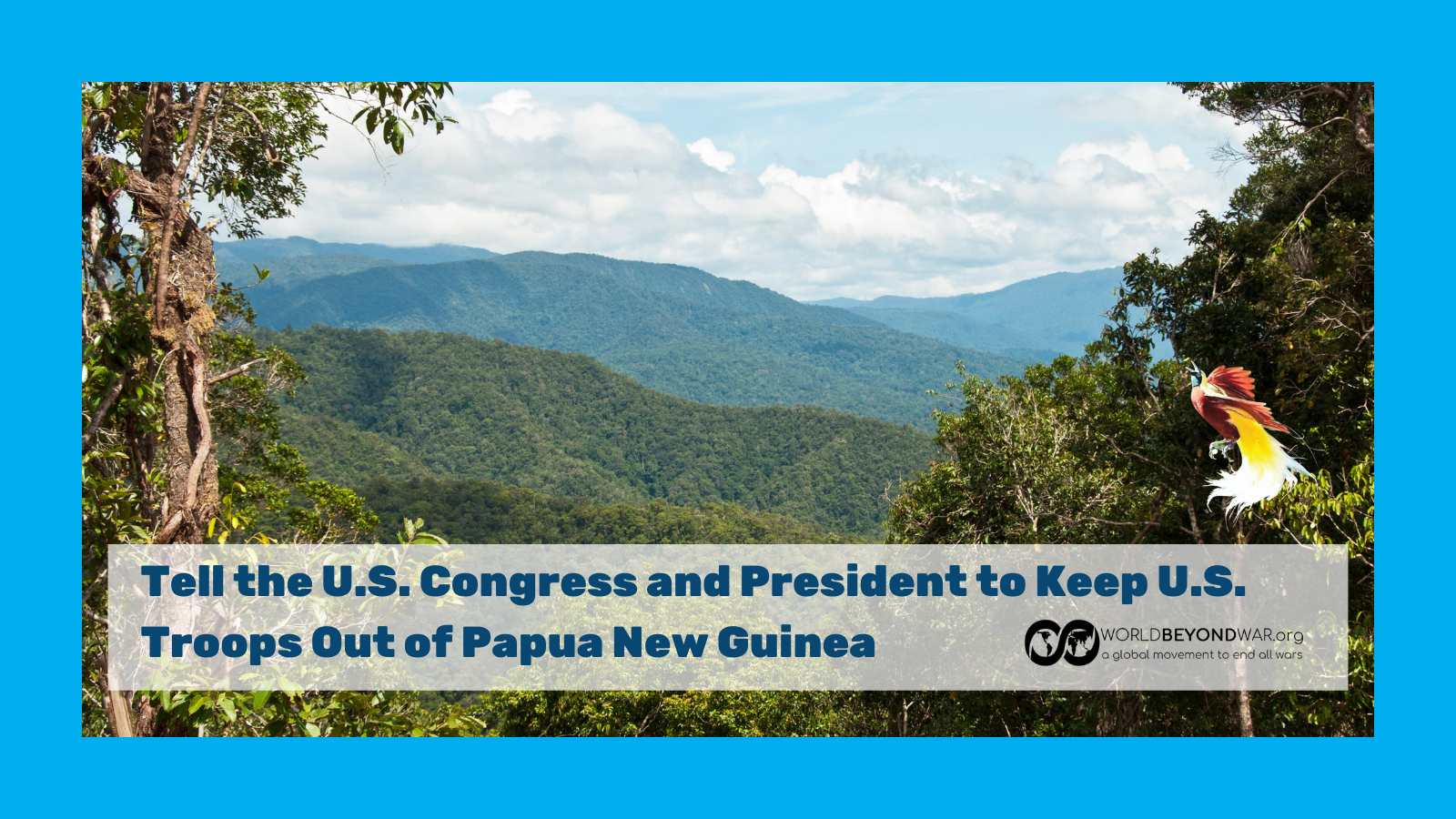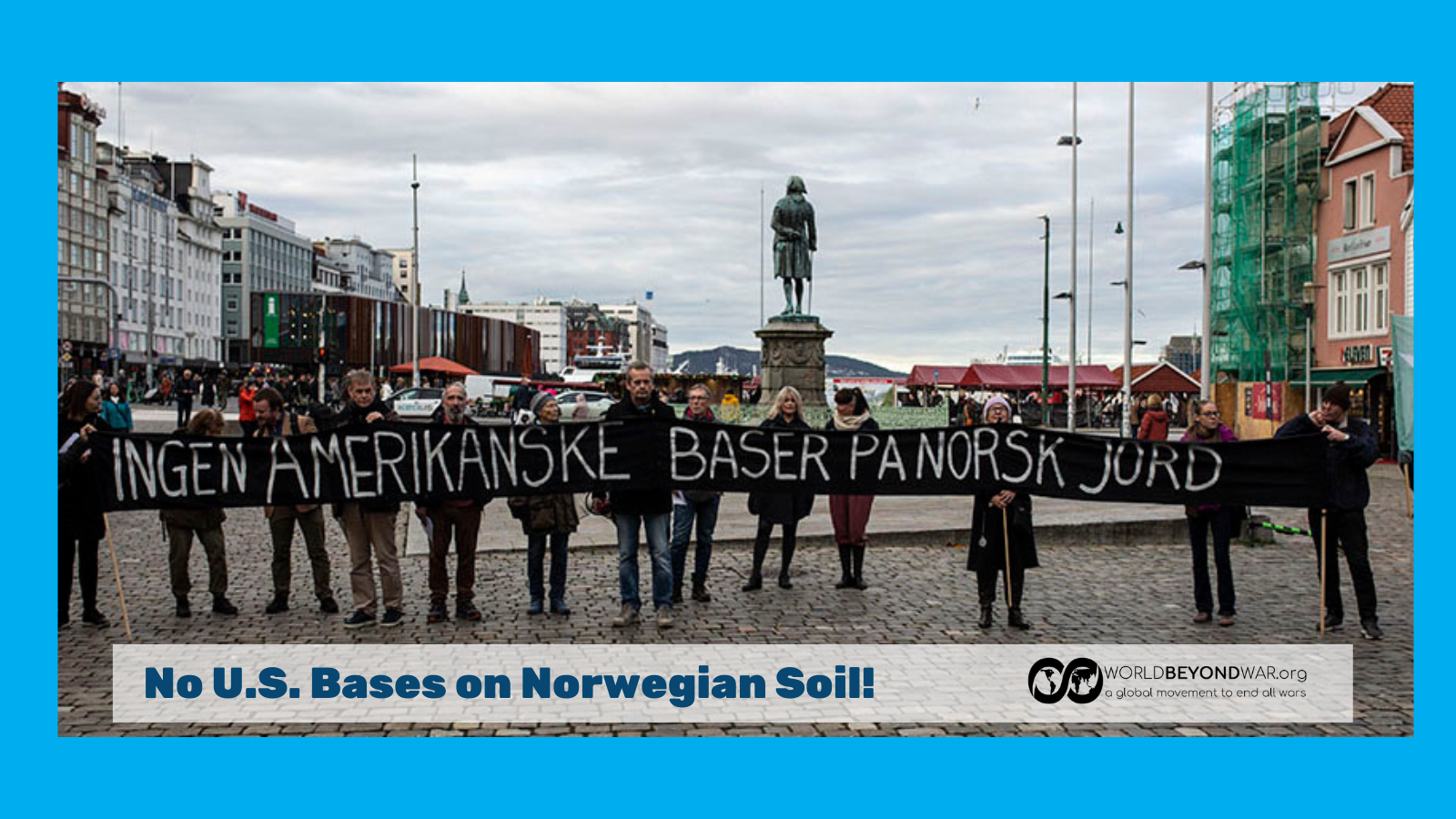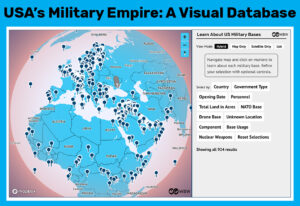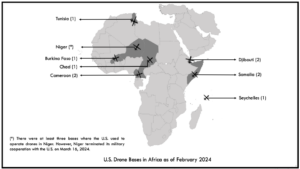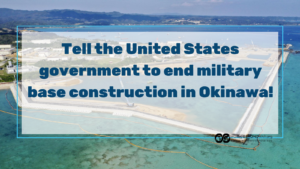
Ending all wars means closing all military bases. An obvious place to start is with bases maintained by nations outside their borders. Of these foreign military bases, the vast majority belong to one nation, the United States. World BEYOND War works globally to block the creation and expansion of bases, and to close existing facilities. To get involved, sign our peace pledge or contact us.
Try our new tool for viewing U.S. foreign bases on a globe.
Join in This Effort to Close Bases in Djibouti
Join in These Efforts to Prevent New Bases
Resources for Closing All Bases
- They heighten tension. The presence of almost 200,000 U.S. troops, massive arsenals, and thousands of aircraft, tanks, and ships in every corner of the Earth present a very real threat to surrounding nations. Their presence is a permanent reminder of the military capacity of the U.S. and are a provocation to other nations. Even worse for heightened tensions, the resources housed on these bases are used for military “exercises,” which are essentially, practice for war.
- They facilitate war. The prepositioning of weapons, troops, communications equipment, aircraft, fuel, etc. make the logistics for U.S. aggression quicker and more efficient. Because the U.S. is continually creating plans for military actions around the world, and because the U.S. military always has some troops “on the ready,” the initiation of combat operations is very simple.
- They encourage militarism. Rather than deterring potential adversaries, U.S. bases antagonize other countries into greater military spending and aggression. Russia, for example, justifies its interventions in Georgia and Ukraine by pointing to encroaching U.S. bases in Eastern Europe. China feels encircled by the more than 250 U.S. bases in the region, leading to a more assertive policy in the South China Sea.
- They provoke terrorism. In the Middle East in particular, U.S. bases and troops have provoked terrorist threats, radicalization, and anti-American propaganda. Bases near Muslim holy sites in Saudi Arabia were a major recruiting tool for al-Qaeda.
- They endanger host countries. Countries which have U.S. military assets stationed on them become targets for attack themselves in response to any U.S. military aggression.
- They house nuclear weapons. Effective 22 January 2020, the Treaty on the Prohibition of Nuclear Weapons (TPNW) will take effect. Nuclear weapons belonging to the U.S. are positioned in five European countries which do not have nuclear weapons themselves: Belgium, Germany, Italy, the Netherlands, and Turkey, plus one that does: the UK. The possibility of an accident, or becoming a target could be catastrophic.
- They support dictators and repressive, undemocratic regimes. Scores of U.S. bases are in more than 40 authoritarian and less-than-democratic countries, including Bahrain, Turkey, Thailand, and Niger. These bases are a sign of support for governments implicated in murder, torture, suppressing democratic rights, oppressing women and minorities, and other human rights abuses. Far from spreading democracy, bases abroad often block the spread of democracy.
- They cause irreparable environmental damage. Most host country agreements were made in the years before many environmental regulations were in place, and even now, the standards and laws that have been created for the U.S. do not apply to U.S. foreign military bases. There are no enforcement mechanisms for host countries to apply to ensure adherence to local environmental regulations either and may not even be permitted to do inspections due to Status of Forces Agreements (SOFA) between the countries. Moreover, when a base is returned to the host country there are no requirements for the U.S. to clean up the damage it has caused, or even disclose the presence of certain toxins like Agent Orange or depleted uranium. The cost to clean up fuel, firefighting foam, etc., can cost billions. Depending on the SOFA, the U.S. may not have to fund any of the clean-up at all. The construction of the bases has caused permanent ecological damage as well. The construction of a new facility which is currently being constructed in Henoko, Okinawa is destroying soft coral reefs and the environment for endangered species. Jeju Island, South Korea, an area designated as an “Absolute Conservation Area” and a UNESCO Biosphere Conservation, and despite strong opposition by inhabitants of Jeju Island, a deep water port is being constructed for use by the U.S. which has caused irreparable damage.
- They cause pollution.The exhaust of U.S. planes and vehicles cause significant degradation of air quality. Toxic chemicals from the bases enters the local water sources, and jets create enormous noise pollution. The U.S. military is the single biggest consumer of fossil fuels and producer of greenhouse gas emissions in the world, yet this is rarely acknowledged during discussion of climate change. In fact, the United States insisted on an exemption for reporting military emissions in the 1997 Kyoto Protocol.
- They cost an exorbitant amount of money. Estimates of the yearly cost of U.S. foreign military bases range from $100 – 250 billion. According to the United Nations, world starvation could be ended for the cost of only $30 billion per year; just imagine what could be done with an additional $70 billion.
- They deny land to indigenous populations. From Panama to Guam to Puerto Rico to Okinawa to dozens of other locations across the world, the military has taken valuable land from local populations, often pushing out indigenous people in the process, without their consent and without reparations. For example, between 1967 and 1973, the entire population of the Chagos Islands – about 1500 people, was forcibly removed from the island of Diego Garcia by the UK so that it could be leased to the U.S. for an airbase. The Chagossian people were taken off their island by force and transported in conditions compared to those of slave ships. They were not allowed to take anything with them and their animals were killed before their eyes. The Chagossians have petitioned the British government many times for return of their home, and their situation has been addressed by the UN. Despite an overwhelming vote of the UN General Assembly, and an advisory opinion by the International Court of Justice in the Hague that the island should be returned to the Chagossians, the UK has refused and the US continues operations from Diego Garcia today.
- They cause economic problems for “host” countries. The rise in property taxes and inflation in areas surround U.S. bases has been known to push locals out of their homes to seek more affordable areas. Many of the communities hosting bases overseas never see the economic windfalls that U.S. and local leaders regularly promise. Some areas, especially in poor rural communities, have seen short-term economic booms touched off by base construction. In the long-term, however, most bases rarely create sustainable, healthy local economies. Compared with other forms of economic activity, they represent unproductive uses of land, employ relatively few people for the expanses occupied, and contribute little to local economic growth. Research has consistently shown that when bases finally close, the economic impact is generally limited and in some cases actually positive — that is, local communities can end up better off when they trade bases for housing, schools, shopping complexes, and other forms of economic development.
- They station American troops who commit crimes. Throughout decades of a permanent U.S. military presence abroad, the military and its personnel have committed many atrocities. Overwhelmingly, the crimes go unnoticed and the perpetrators go unpunished. Rather than a collection of isolated incidents, they comprise a pattern of human rights abuses and, in some cases, war crimes. The lack of respect for the lives and bodies of indigenous people is another product of unequal power relationships between U.S. military and the people whose land they occupy. American troops abroad are often afforded impunity to injure and kill those understood to be inferior to them. These crimes carried out directly by U.S. personnel are suffered by powerless populations who have no recourse to obtain justice. Even their narratives are covered up and ignored. American troops commit crimes out of uniform as well. There is a long history on the Japanese island of Okinawa of the local population suffering violent crime at the hands of the American military including kidnapping, rape, and murders of women and girls. Prostitution is often pervasive around U.S. bases.
See bases mapped across the globe, along with other measures of war and peace.
- United States of War by David Vine
- The Sun Never Sets: Confronting the Network of U.S. Foreign Military Bases by Joseph Gerson
- Base Nation: How U.S. Military Bases Abroad Harm America and the World by David Vine
- Island of Shame: The Secret History of the U.S. Military Base on Diego Garcia by David Vine
- The Bases of Empire: The Global Struggle against U.S. Military Posts by Catherine Lutz
- Homefront by Catherine Lutz
News about the close all bases campaign
Videos about the close all bases campaign
Playlist
16 Videos




